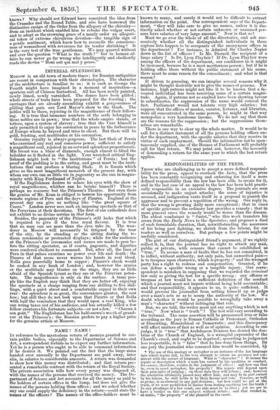NAME! NAME ► In reference to the mysterious return of moneys
granted to cer- tain public bodies, especially to the Department of Science and Art, a correspondent forbids us to expect any further information. Yet he is a person who ought to be able to command information if he desires it. We pointed out the fact that the large sums handed over annually to the Department are paid away, inter alia, in salaries to considerable amounts. A return was demanded to show how this money was distributed ; and that return pre- sented a remarkable contrast with the return of the Royal Society. The private association tells how every penny was disposed of, with the names of the persons that received the money. The De- partment of Science and Art accounts for all the money as paid to the holders of certain offices in the lump, but does not give the names of the persons holding those offices ; and we asked whether any one could supply the deficiency in the return—could state the names of the officers ? The names of the office-holders must be
known to many, and surely it would not be difficult to extract information on the point. Our correspondent says of the Depart- ment, "they will take care to give no names, unless it is dis- tinctly asked whether or not certain unknown or unnamed per- sons have salaries of very large amount." Now is that so ? Must we go over the whole of all the directories, and ask suc- cessively whether all the distinguished individuals in those copious lists happen to be occupants of the anonymous offices in the department ? For instance, is Admiral Sir Charles Napier down in the list of officers ? Is Mr. Disraeli the recipient of a large salary ? Is Dr. Lyon Playfair? If Dr. Lyon Playfair were among the officers of the department, our confidence in it might be increased, because he is a most meritorious person ; but if he is holding office there without the public statement of his name, there must be some reason for the concealment; and what is that reason ?
If driven to guessing, we can imagine several reasons why it might be thought desirable not to give the names of persons. For instance, high patrons might not like it to be known that a fa- voured individual has been receiving sums of a certain magni- tude. Again, if patrons not so exalted have been showing favour to subordinates, the suppression of the name would conceal the fact. Parliament would not tolerate very high salaries ; but suppose that the offices of master, curator, lecturer, and librarian, were all concentrated in the same person, he might in that way monopolize a very handsome income. VVe do not say. that these are the reasons for the suppression; but the suppressions them- selves are remarkable.
There is one way to clear up the whole matter. It would be to call for a distinct statement of all the persons holding offices un- der the department, with the specific salaries that they receive in virtue of each employment. Should the information not be spon- taneously supplied, one of the Houses of Parliament will probably call for that return. We may point out, however, the necessity of demanding a return for the same year to which ;he last return applies.


































 Previous page
Previous page